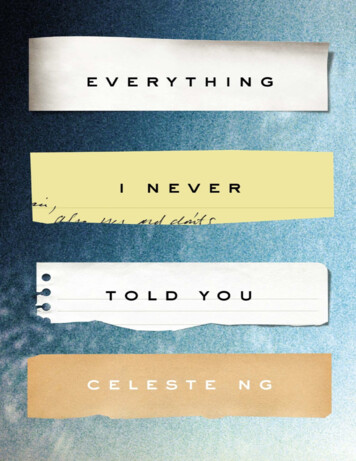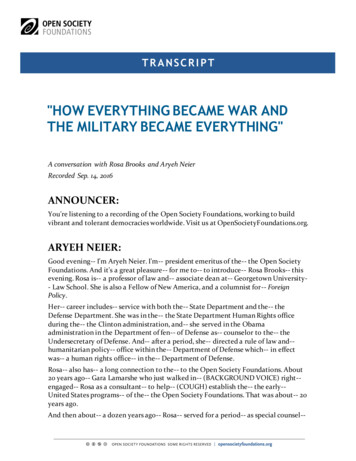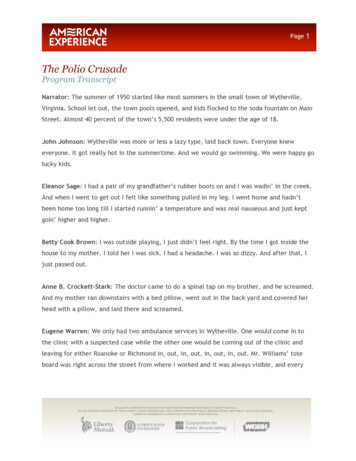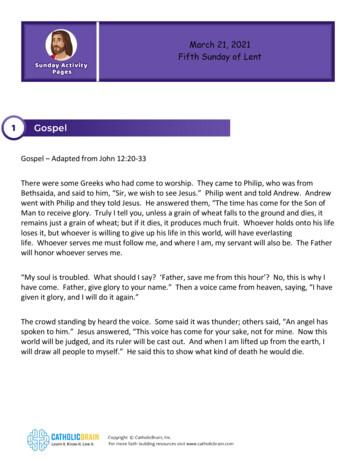
Transcription
THE PENGUIN PRESSPublished by the Penguin GroupPenguin Group (USA) LLC375 Hudson StreetNew York, New York 10014USA Canada UK Ireland Australia New Zealand India South Africa Chinapenguin.comA Penguin Random House CompanyFirst published by The Penguin Press, a member of Penguin Group (USA) LLC, 2014Copyright 2014 by Celeste NgPenguin supports copyright. Copyright fuels creativity, encourages diverse voices, promotes free speech, andcreates a vibrant culture. Thank you for buying an authorized edition of this book and for complying withcopyright laws by not reproducing, scanning, or distributing any part of it in any form without permission. Youare supporting writers and allowing Penguin to continue to publish books for every reader.LIBRARY OF CONGRESS CATALOGING-IN-PUBLICATION DATANg, Celeste.Everything I never told you : a novel / Celeste Ng.pages cmISBN 978-1-101-63461-51. Daughter—Death—Fiction. 2. Drowning—Fiction. 3. Grief—Fiction. I. Title.PS3614.G83E94 2014813'.6—dc23 2013039961This is a work of fiction. Names, characters, places, and incidents either are the product of the author’simagination or are used fictitiously, and any resemblance to actual persons, living or dead, businesses,companies, events, or locales is entirely coincidental.Version 1
for my family
CONTENTSTITLE PAGECOPYRIGHTDEDICATIONchapter onechapter twochapter threechapter fourchapter fivechapter sixchapter sevenchapter eightchapter ninechapter tenchapter elevenchapter twelveAUTHOR’S NOTEACKNOWLEDGMENTS
oneLydia is dead. But they don’t know this yet. 1977, May 3, six thirty inthe morning, no one knows anything but this innocuous fact: Lydia islate for breakfast. As always, next to her cereal bowl, her mother hasplaced a sharpened pencil and Lydia’s physics homework, sixproblems flagged with small ticks. Driving to work, Lydia’s fathernudges the dial toward WXKP, Northwest Ohio’s Best News Source,vexed by the crackles of static. On the stairs, Lydia’s brother yawns,still twined in the tail end of his dream. And in her chair in the cornerof the kitchen, Lydia’s sister hunches moon-eyed over hercornflakes, sucking them to pieces one by one, waiting for Lydia toappear. It’s she who says, at last, “Lydia’s taking a long time today.”Upstairs, Marilyn opens her daughter’s door and sees the bedunslept in: neat hospital corners still pleated beneath the comforter,pillow still fluffed and convex. Nothing seems out of place. Mustardcolored corduroys tangled on the floor, a single rainbow-striped sock.A row of science fair ribbons on the wall, a postcard of Einstein.Lydia’s duffel bag crumpled on the floor of the closet. Lydia’s greenbookbag slouched against her desk. Lydia’s bottle of Baby Soft atopthe dresser, a sweet, powdery, loved-baby scent still in the air. Butno Lydia.Marilyn closes her eyes. Maybe, when she opens them, Lydia willbe there, covers pulled over her head as usual, wisps of hair trailingfrom beneath. A grumpy lump bundled under the bedspread thatshe’d somehow missed before. I was in the bathroom, Mom. I wentdownstairs for some water. I was lying right here all the time. Ofcourse, when she looks, nothing has changed. The closed curtainsglow like a blank television screen.
Downstairs, she stops in the doorway of the kitchen, a hand oneach side of the frame. Her silence says everything. “I’ll checkoutside,” she says at last. “Maybe for some reason—” She keeps hergaze trained on the floor as she heads for the front door, as if Lydia’sfootprints might be crushed into the hall runner.Nath says to Hannah, “She was in her room last night. I heardher radio playing. At eleven thirty.” He stops, remembering that hehad not said goodnight.“Can you be kidnapped if you’re sixteen?” Hannah asks.Nath prods at his bowl with a spoon. Cornflakes wilt and sink intoclouded milk.Their mother steps back into the kitchen, and for one gloriousfraction of a second Nath sighs with relief: there she is, Lydia, safeand sound. It happens sometimes—their faces are so alike you’dsee one in the corner of your eye and mistake her for the other: thesame elfish chin and high cheekbones and left-cheek dimple, thesame thin-shouldered build. Only the hair color is different, Lydia’sink-black instead of their mother’s honey-blond. He and Hannah takeafter their father—once a woman stopped the two of them in thegrocery store and asked, “Chinese?” and when they said yes, notwanting to get into halves and wholes, she’d nodded sagely. “I knewit,” she said. “By the eyes.” She’d tugged the corner of each eyeoutward with a fingertip. But Lydia, defying genetics, somehow hasher mother’s blue eyes, and they know this is one more reason sheis their mother’s favorite. And their father’s, too.Then Lydia raises one hand to her brow and becomes his motheragain.“The car’s still here,” she says, but Nath had known it would be.Lydia can’t drive; she doesn’t even have a learner’s permit yet. Lastweek she’d surprised them all by failing the exam, and their fatherwouldn’t even let her sit in the driver’s seat without it. Nath stirs hiscereal, which has turned to sludge at the bottom of his bowl. Theclock in the front hall ticks, then strikes seven thirty. No one moves.“Are we still going to school today?” Hannah asks.Marilyn hesitates. Then she goes to her purse and takes out herkeychain with a show of efficiency. “You’ve both missed the bus.Nath, take my car and drop Hannah off on your way.” Then: “Don’t
worry. We’ll find out what’s going on.” She doesn’t look at either ofthem. Neither looks at her.When the children have gone, she takes a mug from thecupboard, trying to keep her hands still. Long ago, when Lydia was ababy, Marilyn had once left her in the living room, playing on a quilt,and went into the kitchen for a cup of tea. She had been only elevenmonths old. Marilyn took the kettle off the stove and turned to findLydia standing in the doorway. She had started and set her handdown on the hot burner. A red, spiral welt rose on her palm, and shetouched it to her lips and looked at her daughter through wateringeyes. Standing there, Lydia was strangely alert, as if she were takingin the kitchen for the first time. Marilyn didn’t think about missingthose first steps, or how grown up her daughter had become. Thethought that flashed through her mind wasn’t How did I miss it? butWhat else have you been hiding? Nath had pulled up and wobbledand tipped over and toddled right in front of her, but she didn’tremember Lydia even beginning to stand. Yet she seemed so steadyon her bare feet, tiny fingers just peeking from the ruffled sleeve ofher romper. Marilyn often had her back turned, opening therefrigerator or turning over the laundry. Lydia could have begunwalking weeks ago, while she was bent over a pot, and she wouldnot have known.She had scooped Lydia up and smoothed her hair and told herhow clever she was, how proud her father would be when he camehome. But she’d felt as if she’d found a locked door in a familiarroom: Lydia, still small enough to cradle, had secrets. Marilyn mightfeed her and bathe her and coax her legs into pajama pants, butalready parts of her life were curtained off. She kissed Lydia’s cheekand pulled her close, trying to warm herself against her daughter’ssmall body.Now Marilyn sips tea and remembers that surprise.The high school’s number is pinned to the corkboard beside therefrigerator, and Marilyn pulls the card down and dials, twisting thecord around her finger while the phone rings.“Middlewood High,” the secretary says on the fourth ring. “This isDottie.”
She recalls Dottie: a woman built like a sofa cushion, who stillwore her fading red hair in a beehive. “Good morning,” she begins,and falters. “Is my daughter in class this morning?”Dottie makes a polite cluck of impatience. “To whom am Ispeaking, please?”It takes her a moment to remember her own name. “Marilyn.Marilyn Lee. My daughter is Lydia Lee. Tenth grade.”“Let me look up her schedule. First period—” A pause. “Eleventhgrade physics?”“Yes, that’s right. With Mr. Kelly.”“I’ll have someone run down to that classroom and check.”There’s a thud as the secretary sets the receiver down on the desk.Marilyn studies her mug, the pool of water it has made on thecounter. A few years ago, a little girl had crawled into a storage shedand suffocated. After that the police department sent a flyer to everyhouse: If your child is missing, look for him right away. Checkwashing machines and clothes dryers, automobile trunks, toolsheds,any places he might have crawled to hide. Call police immediately ifyour child cannot be found.“Mrs. Lee?” the secretary says. “Your daughter was not in herfirst-period class. Are you calling to excuse her absence?”Marilyn hangs up without replying. She replaces the phonenumber on the board, her damp fingers smudging the ink so that thedigits blur as if in a strong wind, or underwater.She checks every room, opening every closet. She peeks into theempty garage: nothing but an oil spot on the concrete and the faint,heady smell of gasoline. She’s not sure what she’s looking for:Incriminating footprints? A trail of breadcrumbs? When she wastwelve, an older girl from her school had disappeared and turned updead. Ginny Barron. She’d worn saddle shoes that Marilyn haddesperately coveted. She’d gone to the store to buy cigarettes forher father, and two days later they found her body by the side of theroad, halfway to Charlottesville, strangled and naked.Now Marilyn’s mind begins to churn. The summer of Son of Samhas just begun—though the papers have only recently begun to callhim by that name—and, even in Ohio, headlines blare the latestshooting. In a few months, the police will catch David Berkowitz, and
the country will focus again on other things: the death of Elvis, thenew Atari, Fonzie soaring over a shark. At this moment, though,when dark-haired New Yorkers are buying blond wigs, the worldseems to Marilyn a terrifying and random place. Things like that don’thappen here, she reminds herself. Not in Middlewood, which callsitself a city but is really just a tiny college town of three thousand,where driving an hour gets you only to Toledo, where a Saturdaynight out means the roller rink or the bowling alley or the drive-in,where even Middlewood Lake, at the center of town, is really just aglorified pond. (She is wrong about this last one: it is a thousand feetacross, and it is deep.) Still, the small of her back prickles, likebeetles marching down her spine.Inside, Marilyn pulls back the shower curtain, rings screechingagainst rod, and stares at the white curve of the bathtub. Shesearches all the cabinets in the kitchen. She looks inside the pantry,the coat closet, the oven. Then she opens the refrigerator and peersinside. Olives. Milk. A pink foam package of chicken, a head oficeberg, a cluster of jade-colored grapes. She touches the cool glassof the peanut butter jar and closes the door, shaking her head. As ifLydia would somehow be inside.Morning sun fills the house, creamy as lemon chiffon, lighting theinsides of cupboards and empty closets and clean, bare floors.Marilyn looks down at her hands, empty too and almost aglow in thesunlight. She lifts the phone and dials her husband’s number. For James, in his office, it is still just another Tuesday, and heclicks his pen against his teeth. A line of smudgy typing teetersslightly uphill: Serbia was one of the most powerful of the Balticnations. He crosses out Baltic, writes Balkan, turns the page.Archduke France Ferdinand was assassinated by members ofBlack Ann. Franz, he thinks. Black Hand. Had these students everopened their books? He pictures himself at the front of the lecturehall, pointer in hand, the map of Europe unfurled behind him. It’s anintro class, “America and the World Wars”; he doesn’t expect depth
of knowledge or critical insight. Just a basic understanding of thefacts, and one student who can spell Czechoslovakia correctly.He closes the paper and writes the score on the front page—sixty-five out of one hundred—and circles it. Every year as summerapproaches, the students shuffle and rustle; sparks of resentmentsizzle up like flares, then sputter out against the windowless walls ofthe lecture hall. Their papers grow halfhearted, paragraphs trailingoff, sometimes midsentence, as if the students could not hold athought that long. Was it a waste, he wonders. All the lecture noteshe’s honed, all the color slides of MacArthur and Truman and themaps of Guadalcanal. Nothing more than funny names to giggle at,the whole course just one more requirement to check off the listbefore they graduated. What else could he expect from this place?He stacks the paper with the others and drops the pen on top.Through the window he can see the small green quad and three kidsin blue jeans tossing a Frisbee.When he was younger, still junior faculty, James was oftenmistaken for a student himself. That hasn’t happened in years. He’llbe forty-six next spring; he’s tenured, a few silver hairs now mixed inamong the black. Sometimes, though, he’s still mistaken for otherthings. Once, a receptionist at the provost’s office thought he was avisiting diplomat from Japan and asked him about his flight fromTokyo. He enjoys the surprise on people’s faces when he tells themhe’s a professor of American history. “Well, I am American,” he sayswhen people blink, a barb of defensiveness in his tone.Someone knocks: his teaching assistant, Louisa, with a stack ofpapers.“Professor Lee. I didn’t mean to bother you, but your door wasopen.” She sets the essays on his desk and pauses. “These weren’tvery good.”“No. My half weren’t either. I was hoping you had all the As inyour stack.”Louisa laughs. When he’d first seen her, in his graduate seminarlast term, she’d surprised him. From the back she could have beenhis daughter: they had almost the same hair, hanging dark andglossy down to the shoulder blades, the same way of sitting withelbows pulled in close to the body. When she turned around, though,
her face was completely her own, narrow where Lydia’s was wide,her eyes brown and steady. “Professor Lee?” she had said, holdingout her hand. “I’m Louisa Chen.” Eighteen years at MiddlewoodCollege, he’d thought, and here was the first Oriental student he’dever had. Without realizing it, he had found himself smiling.Then, a week later, she came to his office. “Is that your family?”she’d asked, tilting the photo on his desk toward her. There was apause as she studied it. Everyone did the same thing, and that waswhy he kept the photo on display. He watched her eyes move fromhis photographic face to his wife’s, then his children’s, then backagain. “Oh,” she said after a moment, and he could tell she wastrying to hide her confusion. “Your wife’s—not Chinese?”It was what everyone said. But from her he had expectedsomething different.“No,” he said, and straightened the frame so that it faced her alittle more squarely, a perfect forty-five-degree angle to the front ofthe desk. “No, she isn’t.”Still, at the end of the fall semester, he’d asked her to act as agrader for his undergraduate lecture. And in April, he’d asked her tobe the teaching assistant for his summer course.“I hope the summer students will be better,” Louisa says now. “Afew people insisted that the Cape-to-Cairo Railroad was in Europe.For college students, they have surprising trouble with geography.”“Well, this isn’t Harvard, that’s for sure,” James says. He pushesthe two piles of essays into one and evens them, like a deck ofcards, against the desktop. “Sometimes I wonder if it’s all a waste.”“You can’t blame yourself if the students don’t try. And they’re notall so bad. A few got As.” Louisa blinks at him, her eyes suddenlyserious. “Your life is not a waste.”James had meant only the intro course, teaching these studentswho, year after year, didn’t care to learn even the basic timeline.She’s twenty-three, he thinks; she knows nothing about life, wastedor otherwise. But it’s a nice thing to hear.“Stay still,” he says. “There’s something in your hair.” Her hair iscool and a little damp, not quite dry from her morning shower. Louisaholds quite still, her eyes open and fixed on his face. It’s not a flowerpetal, as he’d first thought. It’s a ladybug, and as he picks it out, it
tiptoes, on threadlike yellow legs, to hang upside down from hisfingernail.“Damn things are everywhere this time of year,” says a voicefrom the doorway, and James looks up to see Stanley Hewitt leaningthrough. He doesn’t like Stan—a florid ham hock of a man who talksto him loudly and slowly, as if he’s hard of hearing, who makes stupidjokes that start George Washington, Buffalo Bill, and Spiro Agnewwalk into a bar . . .“Did you want something, Stan?” James asks. He’s acutelyconscious of his hand, index finger and thumb outstretched as ifpointing a popgun at Louisa’s shoulder, and pulls it back.“Just wanted to ask a question about the dean’s latest memo,”Stanley says, holding up a mimeographed sheet. “Didn’t mean tointerrupt anything.”“I have to get going anyway,” Louisa says. “Have a nice morning,Professor Lee. I’ll see you tomorrow. You too, Professor Hewitt.” Asshe slides past Stanley into the hallway, James sees that she’sblushing, and his own face grows hot. When she is gone, Stanleyseats himself on the corner of James’s desk.“Good-looking girl,” he says. “She’ll be your assistant thissummer too, no?”“Yes.” James unfolds his hand as the ladybug moves onto hisfingertip, walking the path of his fingerprint, around and around inwhorls and loops. He wants to smash his fist into the middle ofStanley’s grin, to feel Stanley’s slightly crooked front tooth slice hisknuckles. Instead he smashes the ladybug with his thumb. The shellsnaps between his fingers, like a popcorn hull, and the insectcrumbles to sulfur-colored powder. Stanley keeps running his fingeralong the spines of James’s books. Later James will long for theignorant calm of this moment, for that last second when Stan’s leerwas the worst problem on his mind. But for now, when the phonerings, he is so relieved at the interruption that at first he doesn’t hearthe anxiety in Marilyn’s voice.“James?” she says. “Could you come home?”
The police tell them lots of teenagers leave home with nowarning. Lots of times, they say, the girls are mad at theirparents and the parents don’t even know. Nath watches themcirculate in his sister’s room. He expects talcum powder andfeather dusters, sniffing dogs, magnifying glasses. Instead thepolicemen just look: at the posters thumbtacked above her desk, theshoes on the floor, the half-opened bookbag. Then the younger oneplaces his palm on the rounded pink lid of Lydia’s perfume bottle, asif cupping a child’s head in his hand.Most missing-girl cases, the older policeman tells them, resolvethemselves within twenty-four hours. The girls come home bythemselves.“What does that mean?” Nath says. “Most? What does thatmean?”The policeman peers over the top of his bifocals. “In the vastmajority of cases,” he says.“Eighty percent?” Nath says. “Ninety? Ninety-five?”“Nathan,” James says. “That’s enough. Let Officer Fiske do hiswork.”The younger officer jots down the particulars in his notebook:Lydia Elizabeth Lee, sixteen, last seen Monday May 2, floweredhalter-neck dress, parents James and Marilyn Lee. At this OfficerFiske studies James closely, a memory surfacing in his mind.“Now, your wife also went missing once?” he says. “I rememberthe case. In sixty-six, wasn’t it?”Warmth spreads along the back of James’s neck, like sweatdripping behind his ears. He is glad, now, that Marilyn is waiting bythe phone downstairs. “That was a misunderstanding,” he says stiffly.“A miscommunication between my wife and myself. A family matter.”“I see.” The older officer pulls out his own pad and makes a note,and James raps his knuckle against the corner of Lydia’s desk.“Anything else?”In the kitchen, the policemen flip through the family albumslooking for a clear head shot. “This one,” Hannah says, pointing. It’sa snapshot from last Christmas. Lydia had been sullen, and Nathhad tried to cheer her up, to blackmail a smile out of her through thecamera. It hadn’t worked. She sits next to the tree, back against the
wall, alone in the shot. Her face is a dare. The directness of herstare, straight out of the page with not even a hint of profile, saysWhat are you looking at? In the picture, Nath can’t distinguish theblue of her irises from the black of her pupils, her eyes like darkholes in the shiny paper. When he’d picked up the photos at thedrugstore, he had regretted capturing this moment, the hard look onhis sister’s face. But now, he admits, looking at the photograph inHannah’s hand, this looks like her—at least, the way she lookedwhen he had seen her last.“Not that one,” James says. “Not with Lydia making a face likethat. People will think she looks like that all the time. Pick a niceone.” He flips a few pages and pries out the last snapshot. “Thisone’s better.”At her sixteenth birthday, the week before, Lydia sits at the tablewith a lipsticked smile. Though her face is turned toward the camera,her eyes are looking at something outside the photo’s white border.What’s so funny? Nath wonders. He can’t remember if it was him, orsomething their father said, or if Lydia was laughing to herself aboutsomething none of the rest of them knew. She looks like a model in amagazine ad, lips dark and sharp, a plate of perfectly frosted cakepoised on a delicate hand, having an improbably good time.James pushes the birthday photo across the table toward thepolicemen, and the younger one slides it into a manila folder andstands up.“This will be just fine,” he says. “We’ll make up a flyer in case shedoesn’t turn up by tomorrow. Don’t worry. I’m sure she will.” Heleaves a fleck of spit on the photo album page and Hannah wipes itaway with her finger.“She wouldn’t just leave,” Marilyn says. “What if it’s some crazy?Some psycho kidnapping girls?” Her hand drifts to that morning’snewspaper, still lying in the center of the table.“Try not to worry, ma’am,” Officer Fiske says. “Things like that,they hardly ever happen. In the vast majority of cases—” He glancesat Nath, then clears his throat. “The girls almost always come home.”When the policemen have gone, Marilyn and James sit down witha piece of scratch paper. The police have suggested they call all ofLydia’s friends, anyone who might know where she’s gone. Together
they construct a list: Pam Saunders. Jenn Pittman. Shelley Brierley.Nath doesn’t correct them, but these girls have never been Lydia’sfriends. Lydia has been in school with them since kindergarten, andnow and then they call, giggly and shrill, and Lydia shouts throughthe line, “I got it.” Some evenings she sits for hours on the windowseat on the landing, the phone base cradled in her lap, receiverwedged between ear and shoulder. When their parents walk by, shelowers her voice to a confidential murmur, twirling the cord aroundher little finger until they go away. This, Nath knows, is why hisparents write their names on the list with such confidence.But Nath’s seen Lydia at school, how in the cafeteria she sitssilent while the others chatter; how, when they’ve finished copyingher homework, she quietly slides her notebook back into herbookbag. After school, she walks to the bus alone and settles intothe seat beside him in silence. Once, he had stayed on the phoneline after Lydia picked up and heard not gossip, but his sister’s voiceduly rattling off assignments—read Act I of Othello, do the oddnumbered problems in Section 5—then quiet after the hang-up click.The next day, while Lydia was curled on the window seat, phonepressed to her ear, he’d picked up the extension in the kitchen andheard only the low drone of the dial tone. Lydia has never really hadfriends, but their parents have never known. If their father says,“Lydia, how’s Pam doing?” Lydia says, “Oh, she’s great, she justmade the pep squad,” and Nath doesn’t contradict her. He’s amazedat the stillness in her face, the way she can lie without even a raisedeyebrow to give her away.Except he can’t tell his parents that now. He watches his motherscribble names on the back of an old receipt, and when she says tohim and Hannah, “Anyone else you can think of?” he thinks of Jackand says no.All spring, Lydia has been hanging around Jack—or the otherway around. Every afternoon, practically, driving around in thatBeetle of his, coming home just in time for dinner, when shepretended she’d been at school all the time. It had emergedsuddenly, this friendship—Nath refused to use any other word. Jackand his mother have lived on the corner since the first grade, andonce Nath thought they could be friends. It hadn’t turned out that
way. Jack had humiliated him in front of the other kids, had laughedwhen Nath’s mother was gone, when Nath had thought she mightnever come back. As if, Nath thinks now, as if Jack had any right tobe talking, when he had no father. All the neighbors had whisperedabout it when the Wolffs had moved in, how Janet Wolff wasdivorced, how Jack ran wild while she worked late shifts at thehospital. That summer, they’d whispered about Nath’s parents, too—but Nath’s mother had come back. Jack’s mother was still divorced.And Jack still ran wild.And now? Just last week, driving home from an errand, he’d seenJack out walking that dog of his. He had come around the lake,about to turn onto their little dead-end street, when he saw Jack onthe path by the bank, tall and lanky, the dog loping just ahead of himtoward a tree. Jack was wearing an old, faded T-shirt and his sandycurls stood up, unbrushed. As Nath drove past, Jack looked up andgave the merest nod of the head, a cigarette clenched in the cornerof his mouth. The gesture, Nath had thought, was less one ofgreeting than of recognition. Beside Jack, the dog had stared him inthe eye and casually lifted its leg. And Lydia had spent all spring withhim.If he says anything now, Nath thinks, they’ll say, Why didn’t weknow about this before? He’ll have to explain that all thoseafternoons when he’d said, “Lydia’s studying with a friend,” or“Lydia’s staying after to work on math,” he had really meant, She’swith Jack or She’s riding in Jack’s car or She’s out with him godknows where. More than that: saying Jack’s name would meanadmitting something he doesn’t want to. That Jack was a part ofLydia’s life at all, that he’d been part of her life for months.Across the table, Marilyn looks up the numbers in the phone bookand reads them out; James does the calling, carefully and slowly,clicking the dial around with one finger. With each call his voicebecomes more confused. No? She didn’t mention anything to you,any plans? Oh. I see. Well. Thank you anyway. Nath studies thegrain of the kitchen table, the open album in front of him. Themissing photo leaves a gap in the page, a clear plastic windowshowing the blank white lining of the cover. Their mother runs herhand down the column of the phone book, staining her fingertip gray.
Under cover of the tablecloth, Hannah stretches her legs andtouches one toe to Nath’s. A toe of comfort. But he doesn’t look up.Instead he closes the album, and across the table, his mothercrosses another name off the list.When they’ve called the last number, James puts the telephonedown. He takes the slip of paper from Marilyn and crosses out KarenAdler, bisecting the K into two neat Vs. Under the line he can still seethe name. Karen Adler. Marilyn never let Lydia go out on weekendsuntil she’d finished all her schoolwork—and by then, it was usuallySunday afternoon. Sometimes, those Sunday afternoons, Lydia mether friends at the mall, wheedling a ride: “A couple of us are going tothe movies. Annie Hall. Karen is dying to see it.” He’d pull a ten fromhis wallet and push it across the table to her, meaning: All right, nowgo and have some fun. He realizes now that he had never seen aticket stub, that for as long as he can remember, Lydia had beenalone on the curb when he came to take her home. Dozens ofevenings he’d paused at the foot of the stairs and smiled, listening toLydia’s half of a conversation float down from the landing above: “Ohmy god, I know, right? So then what did she say?” But now, heknows, she hasn’t called Karen or Pam or Jenn in years. He thinksnow of those long afternoons, when they’d thought she was stayingafter school to study. Yawning gaps of time when she could havebeen anywhere, doing anything. In a moment, James realizes he’sobliterated Karen Adler’s name under a crosshatch of black ink.He lifts the phone again and dials. “Officer Fiske, please. Yes,this is James Lee. We’ve called all of Lydia’s—” He hesitates.“Everyone she knows from school. No, nothing. All right, thank you.Yes, we will.”“They’re sending an officer out to look for her,” he says, settingthe receiver back on the hook. “They said to keep the phone lineopen in case she calls.”Dinnertime comes and goes, but none of them can imagineeating. It seems like something only people in films do, somethinglovely and decorative, that whole act of raising a fork to your mouth.Some kind of purposeless ceremony. The phone does not ring. Atmidnight, James sends the children to bed and, though they don’targue, stands at the foot of the stairs until they’ve gone up. “Twenty
bucks says Lydia calls before morning,” he says, a little too heartily.No one laughs. The phone still does not ring.Upstairs, Nath shuts the door to his room and hesitates. What hewants is to find Jack—who, he’s sure, knows where Lydia is. But hecannot sneak out with his parents still awake. His mother is alreadyon edge, startling every time the refrigerator motor kicks on or off. Inany case, from the window he can see that the Wolffs’ house is dark.The driveway, where Jack’s steel-gray VW usually sits, is empty. Asusual, Jack’s mother has forgotten to leave the front
Everything I never told you : a novel / Celeste Ng. pages cm ISBN 978-1-101-63461-5 1. Daughter—Death—Fiction. . Her silence says everything. "I'll check outside," she says at last. "Maybe for some reason—" She keeps her . She had scooped Lydia up and smoothed her hair and told her how clever she was, how proud her father .









